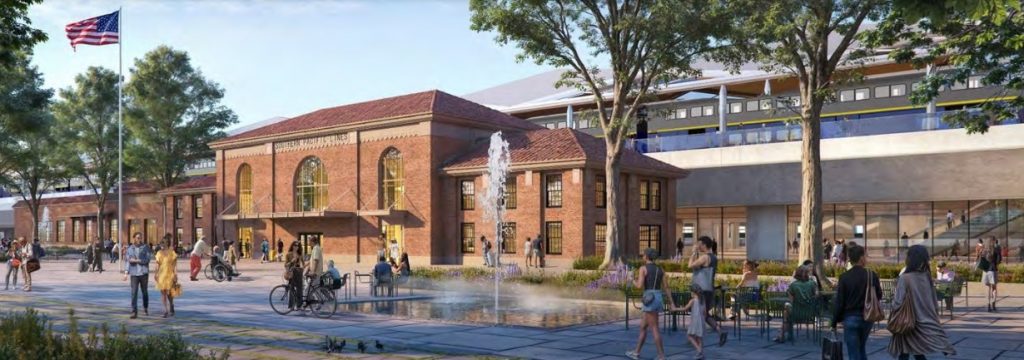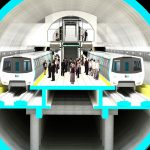SAN JOSE — A wide-ranging plan to usher in a dramatic revamp of the area around a historic train station in downtown San Jose might cost billions of dollars to develop, fresh plans on file with local transit officials show.
The proposals take an early peek at three major alternatives for a modern transit hub that would sprout next to the existing Diridon train station near the corner of West Santa Clara Street and Cahill Street in San Jose.
Street-level and elevated options for a future rail and transit hub in the area of the Diridon train station and SAP Center at 65 Cahill Street near West Santa Clara Street in downtown San Jose, concept. View is from the high-speed rail platform. (Mott MacDonald)
Elevated option for a future rail and transit hub in the area of the Diridon train station and SAP Center at 65 Cahill Street near West Santa Clara Street in downtown San Jose, concept. The existing Whole Foods Market is visible to the left. (Mott MacDonald)
The Diridon Station Joint Policy Advisory Board, which the Santa Clara Valley Transportation Authority established, has received a report with three major options for how a future BART line and anticipated high-speed rail link might connect to a proposed modern transit hub across the street from the SAP Center.
“The approximate cost range of the three alternatives is $2.5 billion to $13 billion,” according to a report prepared by Marian Lee and Melissa Reggiardo, who are affiliated with Caltrain. Lee is a public relations executive and Reggiardo is a Caltrain planning manager.
Future rail and transit hub in the area of the Diridon train station and SAP Center at 65 Cahill Street near West Santa Clara Street in downtown San Jose, concept. View is south across Cahill Plaza. (Mott MacDonald)
Elevated station platform within a future rail and transit hub in the area of the Diridon train station and SAP Center at 65 Cahill Street near West Santa Clara Street in downtown San Jose, concept. An ACE train is visible to the left and a Capitol Corridor train is on the right. (Mott MacDonald)
Here are the three alternatives and their key components:
— Elevated option. Elevated tracks with a ground-level concourse.
— At-Grade option. Tracks are at the street level and the concourse is “slightly below” the street level. The at-grade option attempts to replicate the elevated option yet still avoids raised tracks.
— Stacked option. The concourse would be below the street level and the tracks would be split. The high-speed rail line would be elevated while other rail lines would run at street level.
“All alternatives offer a similar passenger experience at the station,” the report states. “The passenger enters the concourse and goes up the vertical circulation to access the heavy rail tracks and (San Jose International Airport) connector and down for light trail transit.”
It wasn’t precisely clear how the BART tracks would connect to this new transit hub.
“Access options to BART Silicon Valley continue to be evaluated,” the report stated. Two options envision an underground connection to BART while one option indicates a street-level connection to the future BART station at this site.
BART’s southernmost location in Santa Clara County is in northeast San Jose at the Berryessa station. Three more San Jose stations are envisioned, including the Diridon site BART stop.
However, the San Jose BART extension is running behind schedule and above its prior budget targets.
The cost estimates for the future transit hub are preliminary and will almost certainly be fine-tuned.
“The At-Grade Alternative has the lowest cost followed by the Stacked Alternative,” the report stated. “The Elevated Alternative has the highest cost.”
Related Articles
Two San Jose office buildings stabilize loan as lender cancels default
Big East Bay office property is bought by Silicon Valley real estate firm
Big San Jose office building is seized by lender as market wobbles
Elias: Adults living with parents probably not a stable California trend
An entire California town is for sale — again. This time for $6.6 million
Beyond estimates of a low cost of $2.5 billion and a high cost of $13 billion, the report didn’t detail specific costs for any of the three alternatives. The report was prepared for a meeting this afternoon of the Diridon Station Joint Policy Advisory Board.
Plenty of development is being proposed at and near the future transit complex.
Plus, Google has proposed a mixed-use neighborhood near the Diridon train station and SAP Center. Office buildings, housing, stores, restaurants, entertainment hubs, open space and cultural loops will be party of the new neighborhood..
The transit village is stalled, however, stymied by the tech titan’s current regimen of cost controls, layoffs and cutbacks in Google’s real estate footprint.
On the site of the transit hub, office spaces, housing and commercial sites are under consideration, according to the report.
“All station alternatives include a north and south concourse with a connecting commercial corridor with retail, operational space, restaurants, programmed space, and opportunities for both passengers and the public to gather,” the report stated.
Transit agency staffers will continue to refine and fine-tune the plans for the future rail hub.
“Staff will recommend two alternatives for further analysis and public outreach at the August Joint Powers Authority Board meeting,” the report stated.
Staffers deem the Diridon Station and the proposed future rail complex as vital pieces in the regional transit system.
“Diridon Station is integral to California’s transportation network,” the report stated. “To effectively accommodate planned activity and future service needs, the station must be reconfigured, expanded, and upgraded to provide adequate capacity, functionality, and interconnectivity for passengers.”


